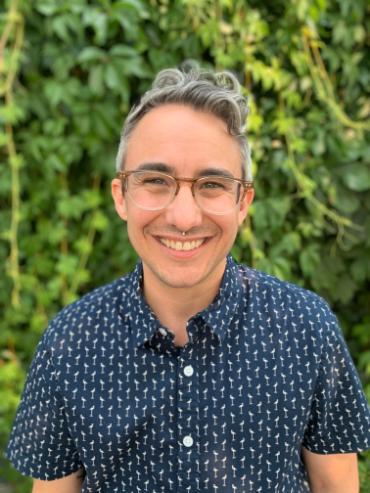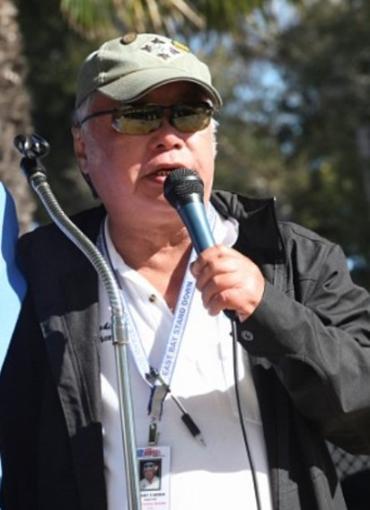 Simon Adriane Ellis knows the health care challenges faced by members of the LGBTQ+ community who wish to start a family. A Certified Nurse Midwife, Ellis is transgender and non-binary using he/they pronouns, and a parent. He is passionate about the need for clinically competent and culturally proficient care for transgender and gender non-conforming patients and for health care environments that welcome people of all gender identities. He advocated for change as a student in Seattle University’s Certified Nurse Midwifery (CNM) program, producing award-winning original research on the Pregnancy and Childbirth Experiences of Trans, Non-Binary and Male Individuals. Since graduating, Ellis has authored numerous peer-reviewed journal articles, contributed to medical books and delivered many presentations and trainings focused on creating a more just health care environment.
Simon Adriane Ellis knows the health care challenges faced by members of the LGBTQ+ community who wish to start a family. A Certified Nurse Midwife, Ellis is transgender and non-binary using he/they pronouns, and a parent. He is passionate about the need for clinically competent and culturally proficient care for transgender and gender non-conforming patients and for health care environments that welcome people of all gender identities. He advocated for change as a student in Seattle University’s Certified Nurse Midwifery (CNM) program, producing award-winning original research on the Pregnancy and Childbirth Experiences of Trans, Non-Binary and Male Individuals. Since graduating, Ellis has authored numerous peer-reviewed journal articles, contributed to medical books and delivered many presentations and trainings focused on creating a more just health care environment.
“Pregnancy is a very vulnerable experience for everyone,” he says, “even more so for trans and non-binary people. There’s nothing scarier than bringing a child into the world without knowing if people will accept your legitimacy as a parent.”
Homophobia and transphobia cause disparities in sexual and mental health care received by members of the LGBTQ+ community. There are lower rates of screening for cervical cancer, for example, because patients are hesitant to see a caregiver who doesn’t understand them and may mistreat or deny them care. Misinformation about the sexual and reproductive health of LGBTQ+ people is another problem.
“Most information related to pregnancy and birth is still extremely gendered,” Ellis explains. “We lack data on pregnancy in trans and non-binary people because there are only a few small studies.”
Research Ellis undertook together with Associate Professor Maria Pettinato, PhD, RN and Professor Danuta Wojnar, PhD, RN, MN, MED, while a nursing student at SU, which was published in the Journal of Midwifery and Women’s Health, revealed two primary findings. First, that trans and non-binary parents experience profound loneliness throughout the entire gestational process from preconception to early parenting. This is largely due to difficulty finding others who are going through the same experience. Second, that preconception is the period of greatest distress and least engagement in medical care for trans and non-binary people. Fear of poor treatment if they share with a caregiver their desire to become pregnant is a driving factor; and one that has proven a reality.
“After completing this research, I began advocating for caregivers to ask all patients during routine preventative visits if they plan to start or add to their existing family,” Ellis says. “If the patient’s reply is yes, an open follow-up question would be appropriate like, ‘how do you see that happening?’ or ‘what’s your vision for that?’ It’s important for the caregiver to make it clear they will not judge the patient’s response.”
He continues, “We need to normalize that parenting is an experience some humans want, and other humans don’t. And caregivers should not assume, based on any of a person’s characteristics, whether they would want that experience. Further, we need to create space in the examination room and in our hearts for the answers that patients of any gender identity give.”
Ellis is creating this space as a nurse midwife atQuilted Health, a private practice championing a new model of midwifery-led collaborative care.
“Quilted is focused on long-term strategy shift,” he explains. “We provide equitable access to compassionate, evidence-based, whole-person pregnancy care focused on meeting the needs of each individual client, particularly those who have historically been underserved. Our continuum of care begins when a patient thinks they are pregnant and continues through one year postpartum—the “bookend” periods in pregnancy that are often neglected. We are also working toward an innovative billing system based on patient outcomes rather than fee for service.”
Ellis is launching Quilted Health’s new Renton location together with a peer from his nursing school cohort, Laura MacPherson, ’12.
“Laura is one of the few midwives of color in the area, and I’m one of the few trans or non-binary midwives” he says. “We’re learning how to hire for equity and to really put those values into practice in a way we rarely see in our field. Laura and I are in a dream position to truly build what we want to see for our patients and ourselves in a clinic that has a lot of support and structure. It’s really exciting.”
Support for the birthing person is another high priority at Quilted Health. “We make doula care accessible for all our patients,” Ellis adds. “It’s one of the inputs we focus on because research tells us the presence of continuous birth support from a doula reduces the risk of interventions during labor. The doula works as part of a team that includes the patient and their support people, a midwife and our nurses. If needed, we’ll add our OB colleagues to the team.”
“Support is even more important for patients from communities that have been poorly served by the medical system and who face disparate outcomes,” he continues. “Having someone you know and trust at your side to help you navigate health care is life-saving. At Quilted, we’re adamant that labor support is a non-negotiable right.”
Ellis experienced a similar kind of life-changing support at SU while working his way through the MSN-CNM program. He was grateful for this, as the reception he’d received from other universities had been less than welcoming. An educator on one interview panel told Ellis that due to his gender identity, patients wouldn’t want to receive care from him and therefore graduating from the CNM program may not be possible.
“It was very upsetting,” Ellis recalls. “I’d been so excited. I felt this was my path, and the implication that my motivations were questionable was concerning to me. But it was different at SU. The university is committed to social justice, and I think the nursing faculty on my interview panel felt my presence in this field could be important for human rights and there was an openness to that possibility.”
Once accepted into SU’s program, Kelly McBroom, PhD, ARNP, CNM became Ellis’s mentor.
“Kelly is still my mentor today and my fiercest advocate within the profession,” he says. “She made sure doors were open to me while I was a student, so I’d have a chance. She ensured that I had clinical positions and mentored me as my preceptor and career coach. She made it clear to me and to others that I belonged.”
Ellis continues to advocate for social justice for his patients and for other trans and non-binary people in the midwifery profession. Just recently, he learned that an initiative he worked on for 10 years to neutralize language in the Midwifery Scope of Practice put forth by the American College of Nurse-Midwives, a national professional association, had achieved its goal. The changes he and a group of catalyst colleagues recommended, such as replacing the word “woman” with “individuals” in the Scope of Practice and adding a statement that midwives care for people of all gender identities, had been approved. The new language is not yet available to the public.
“In medicine we say everything takes 10 years from bench to bedside,” Ellis says, “meaning if we learn something through laboratory research, it usually takes 10 years for the findings to be fully implemented. It appears we’re on the same timeline for implementing social justice within the health care system. But there’s movement.”

 Jerry Yahiro, ’66, decided to attend Seattle University after meeting late President William Sullivan, S.J., on one of Fr. Sullivan’s recruiting trips to Hawai’i. Jerry was among 40 students from Hawai’i when he arrived in Seattle on his first trip to the mainland from his home in Wailuku, Maui. The students formed the Hui O Nani Hawai’i Club shortly thereafter, with Brig. Gen. Paul Y. Chinen, USA (Ret.) ’63 as the first leader. Families back in Hawai’i sent a shipment of “goodies” and the first Lū’au sponsored by the club was held in 1963. The Lū’au is an annual campus event that continues today, and the
Jerry Yahiro, ’66, decided to attend Seattle University after meeting late President William Sullivan, S.J., on one of Fr. Sullivan’s recruiting trips to Hawai’i. Jerry was among 40 students from Hawai’i when he arrived in Seattle on his first trip to the mainland from his home in Wailuku, Maui. The students formed the Hui O Nani Hawai’i Club shortly thereafter, with Brig. Gen. Paul Y. Chinen, USA (Ret.) ’63 as the first leader. Families back in Hawai’i sent a shipment of “goodies” and the first Lū’au sponsored by the club was held in 1963. The Lū’au is an annual campus event that continues today, and the